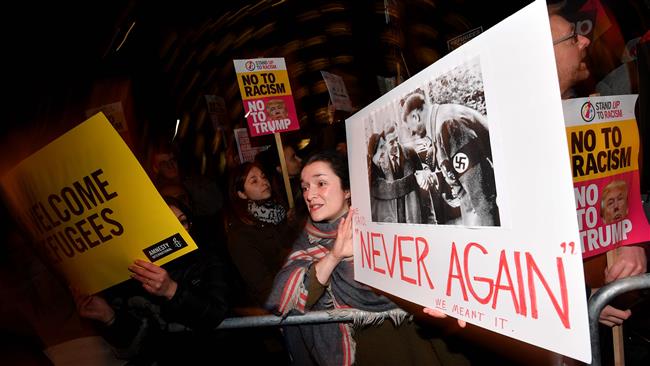
Abe’s Special Gifts Struggle To Satisfy Trump
Abe apparently brought support for the U.S. high-speed rail and other infrastructure projects and investments that would help create 700,000 jobs in the United States. These are currently verbal “gifts” that will be exchanged for America’s continued military support of Japan and a reduction of the price Trump will ask Japan to pay.
According to CNN, Japan was desperately seeking a promise from Trump. What kind of promise? A promise of military and economy. Trump certainly does not want to abandon a U.S. alliance with Japan, especially considering how America’s status in Asia has been sustained through its reliance on Japan. Japan is also able to suppress China, so Trump recently ordered his secretary of defense to speak to Japan on this subject. The United States still values its relationship with Asian countries and has promised Japan that it will continue its military base there.
Abe hopes the Japan-U.S. alliance will be “stronger and firmer,” but this has to be supported with money. Abe clearly understands the limited effects of the “reassurance” tranquilizer Trump has given, and that the number of doses is still controlled by the United States. The primary goal of Trump’s “America First” is to create more employment opportunities and additional markets for U.S. goods around the world.
The United States has made it clear that it will not quickly accept Japan’s “IOU payment.” This year, the Pentagon is set to spend around $5.5 billion on U.S. military bases in Japan. Japan will spend $1.8 billion on maintenance for the bases and still needs to pay an additional $4 billion to cover other expenses, including compensation to the communities of the bases and for the relocation of the American military. Though this would seem to be enough, the U.S. still feels like it is not, because American soldiers are risking their lives to “watch the gates” for Japan.
Trump’s calculations are very meticulous. He is focused on the U.S.’s $68.9 billion (2016) trade deficit with Japan. According to American officials, Trump’s criticism of the unfair trade between Japanese and American automobiles will become an important political topic. Though Japan has lowered its automobile customs taxes to nearly zero, the U.S. still insists that Japan’s safety standards create an invisible barrier. In addition, the U.S. is also unsatisfied with Japan’s customs taxes for the agriculture industry.
Japan is an island country that lacks a military and market development. In this current era, where consumers are kings, the size of the market decides the weight of one’s words. The reason Trump abandoned the TPP was not to hamper international trade, but to expand America’s own market and settle things with its “brothers,” like Japan. There are no free lunches in the world, and America’s assistance does not come without a price.
The relationship between Japan and the United States seems very solid, but in the end it is profit that businessmen care about. Sometimes, capitalism is very kind and brotherly; at other times, it will turn its back and use you. At the end of the Hollywood film, “Killing Them Softly,” the main character muffled, “America's not a country. It's just a business. Now pay me.”


